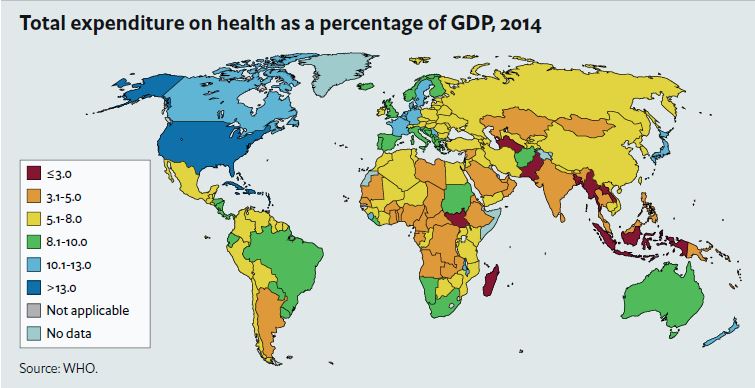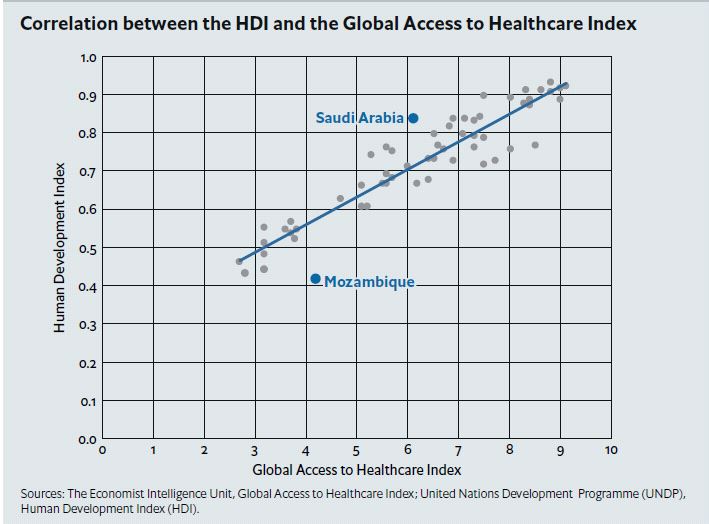The Global Access to Healthcare Index, created by The Economist Intelligence Unit (EIU) and commissioned by Gilead Sciences, was launched last week at the Global Access to Healthcare conference in London. The need to address major access challenges is becoming increasingly urgent in light of population ageing and multimorbidity, the rise in chronic diseases alongside infectious diseases in many developing countries (the "double burden of disease"), and the new focus on patient outcomes and value (the paradigm of value-based healthcare).
For these reasons, the index is a timely tool to help policymakers identify priority areas in addressing access challenges. It measures how healthcare systems are working to solve the most pressing healthcare needs of their populations. The index assesses 60 countries with a diversity of income levels based on a number of categories, organised in two domains—accessibility and healthcare systems. The accessibility domain provides a country-level snapshot of current access to prevention and treatment services across a set of disease areas. In the case of the healthcare systems domain, the index measures the conditions that allow for good access to effective and relevant healthcare services, such as policy, institutions and infrastructure (see chart below).

The top performers in the index are the Netherlands (1st), France, Germany (tied for 2nd), Australia and the UK (tied for 4th), while the Democratic Republic of the Congo (59th) and Afghanistan (60th) are at the bottom of the index.

The key finding from the index research is that political will and a social compact are crucial prerequisites for access to healthcare. Most of the countries with the highest scores on the index share a political and financial commitment to improving access to healthcare and a strong civil society in which corruption levels are low, accountability is high, and the public expects services to be available for them.
Political leadership and commitment are crucial, given the role of the state in regulating healthcare in systems that are often mixed between public and private, says Sofi Bergkvist, founding managing director of ACCESS Health International and both a speaker at the event and an interviewee for the index's accompanying report, Global access to healthcare: Building sustainable health systems.
Moreover, public investment underpins good access and demonstrates the commitment of governments to ensuring the health of their populations. The World Health Organisation has recommended that countries spend a minimum of 5% of GDP on health in order to be taken seriously on provision of access. However, many countries fall short of that target. For example, World Bank data show that in several populous developing countries, such as India, Pakistan and Nigeria, the public sector spends less than or around 1% of GDP on healthcare.
That said, some countries have shown more financial commitment that others. For example, over the past ten years Vietnam and the Dominican Republic have more than doubled the proportion they spend on health within their public budgets. Meanwhile, out-of-pocket expenditure on health has decreased over the past ten years in 72% of countries.
Quality of spending matters
It is not only important how much money is spent, but how well it is spent. “What matters is not just more spending, but also the quality of spending and universal access,” says Prabhat Jha, a professor at the Dalla Lana School of Public Health at the University of Toronto and both an interviewee for the report and a speaker at the event.
Although advanced and relatively rich European countries do particularly well in the Global Access to Healthcare Index, several poorer countries are using innovation as an important route to extending access. The governments of Iran and Indonesia, for example, have explicitly committed to increasing funding for healthcare coverage by cutting fuel subsidies, says another event speaker and report interviewee, Robert Yates, project director for the Universal Health Coverage (UHC) Policy Forum at Chatham House.
Despite many challenges, the study finds that the rewards of extending access to healthcare can be huge, as suggested by the strong correlation between human development (health, education and income) and access to healthcare (see chart].
The Global access to healthcare hub is located at http://accesstohealthcare.eiu.com/.
The views and opinions expressed in this article are those of the authors and do not necessarily reflect the views of The Economist Intelligence Unit Limited (EIU) or any other member of The Economist Group. The Economist Group (including the EIU) cannot accept any responsibility or liability for reliance by any person on this article or any of the information, opinions or conclusions set out in the article.







